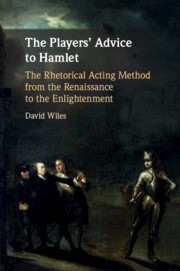 The Players' Advice to Hamlet
The Players' Advice to Hamlet Published online by Cambridge University Press: 16 January 2020
The term ‘declamation’ shifted its meaning from a training and display exercise undertaken by orators to a mode of speech used by tragic actors. By the end of the seventeenth century, the logic of grammar had suppressed the vagaries of orality, and the term ‘declamation’ served to define that which separated dramatic speech from the speech of everyday life. Because speech is driven by the breath and produced by the body, the thought or idea expressed by the actor could not be dissociated from their feeling or passion. In the sixteenth century and for much of the seventeenth century the dramatic text was conceived as sonorous matter, a visual sign of corporeal actions. The second phase follows from words becoming the arbitrary signs of ideas. From the perspective of a modern taste for self-expression, the earlier conception of the text as a score places unwelcome constraints upon the actor’s freedom.
To save this book to your Kindle, first ensure [email protected] is added to your Approved Personal Document E-mail List under your Personal Document Settings on the Manage Your Content and Devices page of your Amazon account. Then enter the ‘name’ part of your Kindle email address below. Find out more about saving to your Kindle.
Note you can select to save to either the @free.kindle.com or @kindle.com variations. ‘@free.kindle.com’ emails are free but can only be saved to your device when it is connected to wi-fi. ‘@kindle.com’ emails can be delivered even when you are not connected to wi-fi, but note that service fees apply.
Find out more about the Kindle Personal Document Service.
To save content items to your account, please confirm that you agree to abide by our usage policies. If this is the first time you use this feature, you will be asked to authorise Cambridge Core to connect with your account. Find out more about saving content to Dropbox.
To save content items to your account, please confirm that you agree to abide by our usage policies. If this is the first time you use this feature, you will be asked to authorise Cambridge Core to connect with your account. Find out more about saving content to Google Drive.